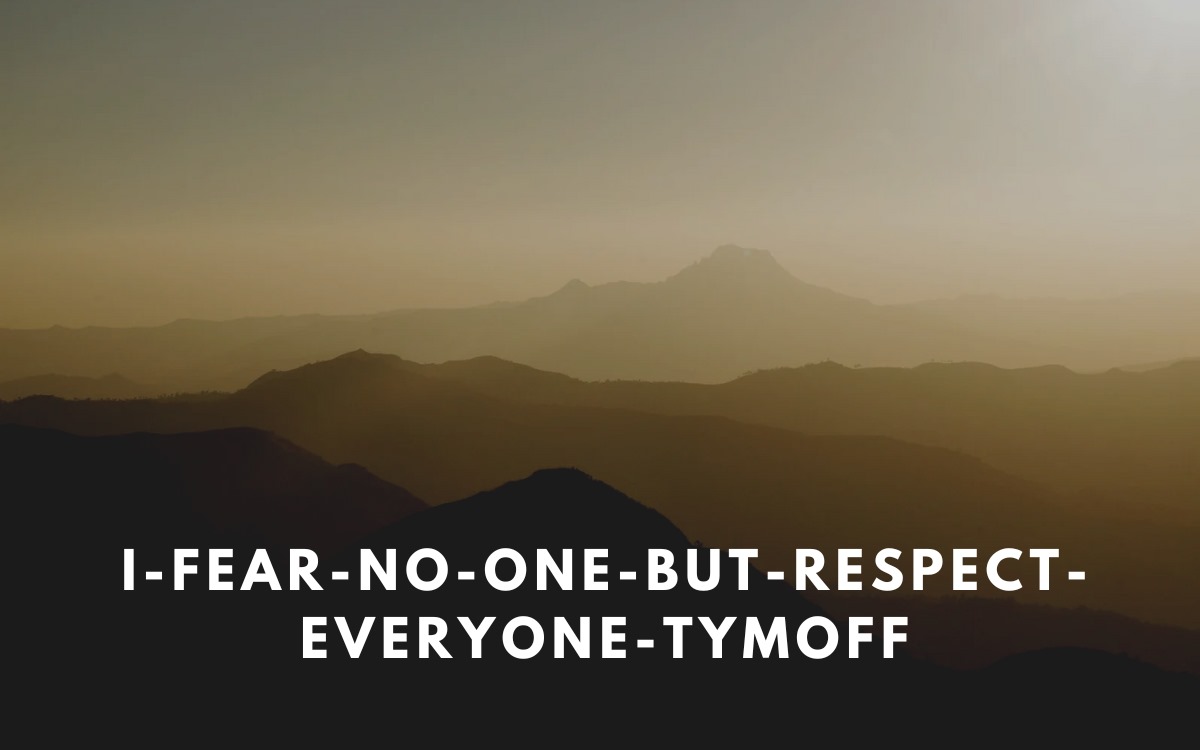i fear no one, but respect everyone. – tymoff, In a world often characterized by power dynamics, competition, and the pursuit of dominance, the statement “I fear no one, but respect everyone” stands out as a profound and refreshing perspective. Attributed to Tymoff, this philosophy encapsulates a balanced approach to interpersonal relationships, emphasizing both self-confidence and mutual respect. This article explores the depth of this statement, examining its implications, applications, and the wisdom it holds for individuals and society at large.
The Nature of Fear
Fear is a fundamental human emotion, often rooted in the instinct for self-preservation. It can manifest in various forms, from the fear of physical harm to the fear of failure, rejection, or loss of social status. While fear can serve as a protective mechanism, it can also be paralyzing and detrimental to personal growth and relationships.
Fearing no one, as Tymoff suggests, is not about arrogance or recklessness. It is about cultivating a sense of inner strength and self-assurance. This kind of fearlessness allows individuals to navigate the world with confidence, free from the constraints imposed by anxiety or intimidation. It is about understanding one’s worth and abilities, and recognizing that no other person has the power to undermine them.
The Essence of Respect
Respect, on the other hand, is about recognizing the inherent value and dignity of others. It involves acknowledging their rights, feelings, and perspectives, regardless of differences or disagreements. Respect is a cornerstone of healthy relationships and a harmonious society. It fosters empathy, understanding, and cooperation, allowing people to coexist peacefully and productively.
Respecting everyone, as per Tymoff’s philosophy, does not mean agreeing with everyone or condoning all behaviors. Rather, it means treating others with the consideration and regard they deserve as fellow human beings. It involves listening, being open-minded, and valuing diverse viewpoints.
Balancing Fearlessness and Respect
The balance between fearlessness and respect is crucial. Fearlessness without respect can lead to arrogance and insensitivity, while respect without a sense of self-worth can result in subservience and loss of individuality. Tymoff’s statement suggests a harmonious integration of these two principles, where one can stand firm in their own identity while honoring the identity of others.
Fearlessness and Leadership
In leadership, the principle of fearing no one is particularly relevant. Effective leaders are those who can make decisions with confidence, take risks, and stand up for their beliefs and values. They are not easily swayed by external pressures or the opinions of others. However, true leadership also requires respect for others. Leaders who respect their team members inspire loyalty, trust, and collaboration. They create an environment where everyone feels valued and empowered to contribute their best.
Respect in Personal Relationships
In personal relationships, respect is the foundation of trust and intimacy. When individuals respect each other, they create a safe space where they can be vulnerable, share their true selves, and grow together. Fearlessness in this context means being open and honest, not hiding behind facades or avoiding difficult conversations. It means having the courage to address issues head-on and work through conflicts constructively.
Fearlessness in Personal Growth
Personal growth often requires stepping out of one’s comfort zone and facing challenges head-on. Fearing no one means not being deterred by the fear of judgment, failure, or rejection. It means pursuing one’s goals and passions with determination and resilience. Respect, in this context, involves self-respect – acknowledging one’s own needs, boundaries, and aspirations. It also involves respecting the journey of others, understanding that everyone is on their own path and at their own pace.
Respect in Diversity and Inclusion
In today’s globalized world, respect for diversity and inclusion is more important than ever. Respecting everyone means valuing the rich tapestry of cultures, perspectives, and experiences that make up our world. It means actively listening to and learning from those who are different from us, and challenging our own biases and prejudices. Fearlessness in this context involves standing up against discrimination, injustice, and inequality, and advocating for a more inclusive and equitable society.
The Psychological Perspective
From a psychological perspective, the integration of fearlessness and respect can be seen as a sign of emotional intelligence and maturity. Emotional intelligence involves being aware of and managing one’s own emotions, as well as understanding and influencing the emotions of others. It requires a balance of self-assuredness and empathy, confidence and humility.
Self-Confidence and Self-Esteem
Self-confidence is closely tied to the idea of fearing no one. It involves believing in one’s abilities and being willing to take risks. Healthy self-esteem, however, also includes self-respect – recognizing one’s own worth and treating oneself with kindness and consideration. Self-respect also means setting boundaries and not allowing oneself to be treated poorly by others.
Empathy and Social Awareness
Respecting everyone involves empathy – the ability to understand and share the feelings of others. It requires social awareness and the ability to navigate complex social dynamics with sensitivity and grace. It also involves recognizing the impact of one’s actions on others and taking responsibility for that impact.
The Philosophical Perspective
Philosophically, Tymoff’s statement can be seen as a reflection of humanistic values, which emphasize the inherent worth and dignity of every individual. Humanism advocates for a balance between individual autonomy and social responsibility, self-assertion and compassion.
Existentialism and Authenticity
Existentialist philosophers, such as Jean-Paul Sartre and Simone de Beauvoir, have emphasized the importance of living authentically – being true to oneself and one’s values. This involves a form of fearlessness, as it requires breaking free from societal expectations and norms. However, existentialism also recognizes the interconnectedness of human beings and the ethical responsibility to respect the freedom and dignity of others.
Confucianism and Harmony
In Eastern philosophy, particularly Confucianism, there is a strong emphasis on respect and harmony in relationships. Confucian ethics advocate for a balanced approach to social interactions, where individuals cultivate virtues such as respect, kindness, and propriety. Fearlessness, in this context, can be seen as the courage to act with integrity and righteousness, even in the face of adversity.
Practical Applications
In the Workplace
In the workplace, a culture of fearlessness and respect can lead to greater innovation, productivity, and job satisfaction. Employees who feel respected are more likely to be engaged and motivated, and those who are encouraged to take risks and express their ideas are more likely to drive positive change. Leaders can foster this culture by modeling respectful behavior, providing opportunities for professional growth, and creating an environment where diverse perspectives are valued.
In Education
In education, teaching students the principles of fearlessness and respect can help them become confident, empathetic, and socially responsible individuals. Educators can promote these values by encouraging critical thinking, open dialogue, and collaborative learning. By respecting students’ individuality and fostering a safe and inclusive learning environment, educators can help students develop a strong sense of self-worth and mutual respect.
In Parenting
In parenting, instilling the values of fearlessness and respect can help children grow into well-rounded and resilient individuals. Parents can model these values by encouraging their children to pursue their interests and dreams without fear of failure, while also teaching them to respect others and appreciate diversity. This involves setting clear boundaries, providing guidance and support, and fostering open and honest communication.
In Personal Development
For personal development, embracing fearlessness and respect can lead to a more fulfilling and meaningful life. It involves setting and pursuing personal goals with determination, while also being mindful of the impact of one’s actions on others. It means cultivating self-awareness, practicing empathy, and striving for continuous growth and improvement.
Conclusion
The philosophy of fearing no one but respecting everyone, as articulated by Tymoff, offers a powerful framework for navigating the complexities of human relationships and personal development. It calls for a balance of self-confidence and humility, assertiveness and empathy, individual autonomy and social responsibility. By embracing this philosophy, individuals can cultivate inner strength and resilience, build healthy and harmonious relationships, and contribute to a more just and compassionate world.
This balanced approach to life not only enhances personal well-being but also fosters a culture of mutual respect and cooperation. In a world often divided by fear and mistrust, the wisdom of fearing no one but respecting everyone is a beacon of hope and a call to action. It reminds us that true strength lies not in dominating others, but in uplifting and honoring the dignity of every person we encounter.

